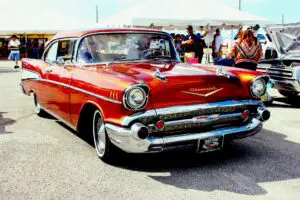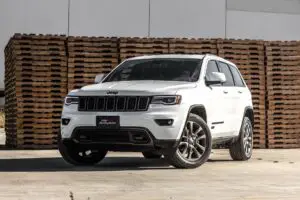Since the production of new cars has been slowed down considerably, more and more people purchase their vehicles from second-hand dealers. While this might have solved the supply problem, are used car dealerships good for consumers?
Used car dealerships are a good option for anyone looking to buy a pre-owned vehicle. Second-hand sellers typically have an extensive car selection while also providing competitive prices and excellent deals. Their warranties ensure that any problems with the car are immediately addressed.

While purchasing a second-hand car always has its risks, having a clear goal in mind and understanding the marketplace will allow you to make a decision that best suits your needs.
Table of Contents
Are Used Car Dealerships Good for Shopping a Vehicle?
There are more than a few reasons why used car dealerships are good places to buy a vehicle. For starters, they offer competitive prices, meaning you can often get much better deals than anywhere else.
These dealerships also tend to have a much more extensive selection, so you’re more likely to find the exact car you’re looking for. In addition to having much lower prices, these dealerships can help you avoid many of the common problems that can come with second-hand cars.
Every car they sell comes with full-service histories and is thoroughly inspected by mechanics, so you can be sure that the four-wheeler you want was checked out and is in good condition.
Car dealers also offer warranties and guarantees, which can give you peace of mind in case something goes wrong with the car. If you do end up having a problem, their excellent customer service will quickly provide you with a solution.
Is It Better to Get a Car From Used Car Dealerships or Private Sellers?
Purchasing a car from second-hand dealers is often better than getting it from a private seller. When you buy a car from a dealership, you are buying it from a licensed and authorized car dealer. This means you’ll be dealing with professionals at a reputable business that will address and fix any problems that come up with your car, often at no extra cost.
On the other hand, buying directly from an individual is often not as safe, as sketchy private sellers will do anything to get you to buy their car. Since they can deny you the opportunity to conduct independent tests, purchasing anything from them will potentially expose you to a scam. If something is wrong with the vehicle, you would have to pay for these repairs yourself.
Car dealerships are also very good at working with your budget, whereas a private seller may not be as flexible. Dealers are also open to negotiations, allowing you to get a deal at a much better price. Finally, most manufacturers also recommend buying their vehicles from an authorized dealer, which is another reason to consider the benefits of dealerships.

What Do You Need to Consider When Buying a Pre-owned Vehicle?
Four-wheelers come in all shapes and sizes, so there are plenty of things to consider when buying a pre-owned car. Since prices vary based on the vehicle’s make, model, year, and mileage, it’s crucial that you determine exactly what kind of car you want to buy, as well as the size of your budget.
To give you an idea of how much money you might need, take a look at how much some of the better second-hand models cost when they are brand new.
| Car Model | Toyota Corolla | Ford Focus | Subaru Crosstrek | Kia Soul (Base) |
| Vehicle Size Class | Compact | Compact | Subcompact SUV | Subcompact Crossover SUV |
| Model Year | 2019 | 2016 | 2022 | 2018 |
| Suggested Price | $19,600 | $18,000 | $22,500 | $17,000 |
Since new vehicles lose a lot of their value as soon as they leave the salon, a pre-owned car will usually be much cheaper. Conversely, second-hand cars only lose a fraction of their value over time, which makes getting one a much better deal in the long run.
Go Over All the Data and Terms and Perform an Inspection Before Signing the Agreement
By doing your research and asking the right questions, you can make an informed decision about whether or not to buy a specific pre-owned car. That’s why you always want to:
- Check the car’s history,
- Inspect it yourself,
- Get a pre-purchase inspection from a mechanic,
- Take it for a test drive.
While the process of going through some of these steps might be a nuisance, it will keep you from making a wrong decision, potentially saving you thousands of dollars.

Have a Clear Price Goal Before Negotiating Starts
When negotiating the price, it is vital to have a firm understanding of the car’s market value. For starters, research the car’s Kelley Blue Book value. If the car is valued somewhere between $8,000 and $10,000, this is the price range you should be negotiating for.
Remember, if a dealer can sell a car at its blue book value, they are still making money. This means that you should try to negotiate a price that is between the car’s actual worth and the sticker price.
If you don’t have enough experience, give yourself a limit on what you are willing to spend. Having a clear goal makes it easier to negotiate with salespeople and managers. If they sense that you are not going to budge on your price, they will be more likely to give in and meet your requirements.
If the dealership refuses to meet your offer, it’s better to continue your search elsewhere. Don’t be afraid to break off negotiations with a single dealer if you feel like they aren’t offering what you want and go elsewhere.
With a firm goal in mind and prior research, you can talk down the price of the car in order to meet your spending requirements.

Make a Decision That Suits Your Needs the Best
There are many factors to consider when deciding whether or not a used car dealership is a good option for you. To make the best decision, you should ask yourself if this particular dealer has cars that meet your needs and budget, how it handles repairs for after-purchase issues, and what their warranty period is. If something is not to your liking, it’s probably better to look elsewhere.









